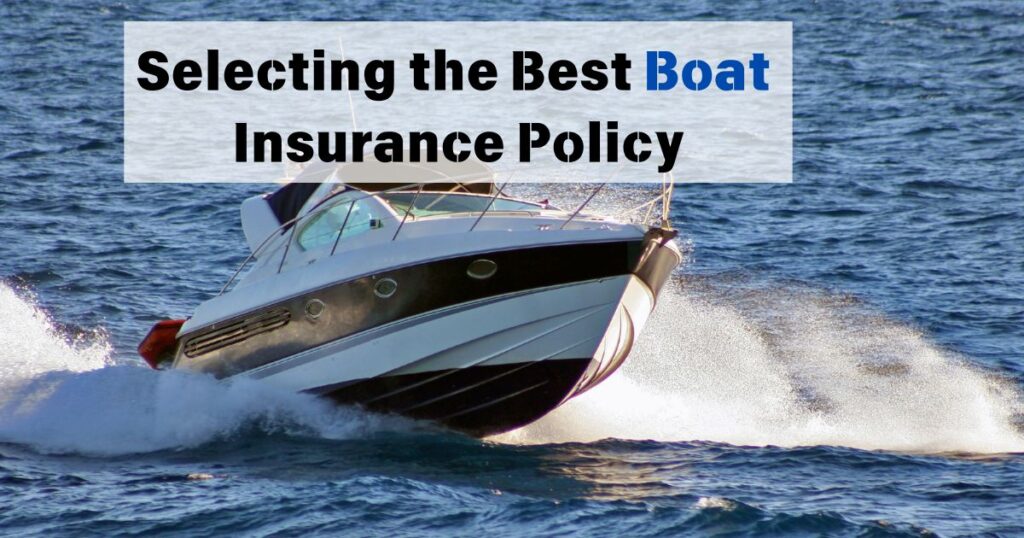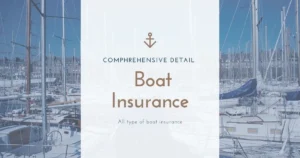Owning an older boat comes with its own set of joys and challenges. Whether it’s the nostalgia of navigating through waters in a vintage vessel or the meticulous care it requires, one thing remains certain: boat insurance is crucial. This guide delves into the specifics of insuring older boats, ensuring your prized possession is well-protected.
Understanding Boat Insurance
What is Boat Insurance?
Boat insurance is a policy that offers financial protection against damages or losses to your boat. It covers various aspects like physical damage, liability, and more, providing peace of mind when you’re out on the water.
Boat Insurance Quote
Getting a boat insurance quote is an essential step for any boat owner looking to protect their investment. A boat insurance quote provides an estimate of the premium you will need to pay to insure your vessel. It typically covers various aspects, including liability, physical damage, medical payments, and sometimes additional protections like uninsured boater coverage. The quote process starts with providing detailed information about your boat, such as its make, model, year, and value. Insurers will also consider the boat’s usage (whether for personal, commercial, or racing purposes), the primary location where it will be used, and your boating history. These factors help the insurance company assess the risk involved and determine the cost of the policy.
The type of coverage you select greatly influences the quote. For instance, an “Agreed Value” policy, which guarantees a set payout amount in the event of a total loss, often has higher premiums compared to an “Actual Cash Value” policy, which takes depreciation into account. Liability coverage, which protects you against legal claims if you’re found responsible for damage or injury, is another critical component of the quote. Comprehensive coverage, which includes protection against theft, vandalism, and natural disasters, also adds to the premium.
When requesting a quote, you might be asked about any safety features on your boat, such as fire extinguishers, GPS systems, and life vests, as these can lower your premiums. Regular maintenance records and any recent upgrades can also positively impact the quote, as they indicate the boat is well-cared-for and less likely to suffer from preventable issues. Some insurers offer discounts for completing boating safety courses or for having a clean boating record without any previous claims.
Comparing quotes from different insurers is crucial. Each company has its own method of calculating premiums, and shopping around ensures you get the best coverage at the most competitive price. Online tools and broker services can simplify this process by allowing you to enter your information once and receive multiple quotes. Remember, the cheapest quote isn’t always the best. Look for comprehensive coverage and reliable customer service, especially in handling claims.
In summary, obtaining a boat insurance quote involves providing detailed information about your boat and its use, selecting the appropriate coverage types, and considering safety features and maintenance practices. By comparing quotes from multiple insurers, you can find a policy that offers both affordability and peace of mind, ensuring your time on the water remains worry-free.
Types of Coverage
There are several types of coverage available in boat insurance:
- Physical Damage Coverage: Protects against damage to your boat and its equipment.
- Liability Coverage: Covers legal liabilities in case of accidents or injuries.
- Medical Payments Coverage: Pays for medical expenses if someone is injured on your boat.
- Uninsured/Underinsured Boater Coverage: Offers protection if you’re hit by a boater with insufficient insurance.
Why Insure Older Boats?
Value Preservation
Older boats can hold significant sentimental and monetary value. Insurance helps preserve this value by covering repair and restoration costs.
Risk Management
Older boats are more prone to mechanical failures and wear and tear. Insurance mitigates these risks by covering potential repair expenses.
Legal Requirements
In many areas, boat insurance is mandatory. Ensuring your older boat complies with these regulations avoids legal complications.
Types of Boat Insurance Policies
Agreed Value vs. Actual Cash Value
- Agreed Value: You and the insurer agree on the boat’s value at the time of the policy. This ensures a clear payout amount in case of a total loss.
- Actual Cash Value: The payout is based on the boat’s depreciated value, which may be lower than the agreed value.
Liability Coverage
Essential for covering legal expenses if you’re found responsible for an accident or damage.
Comprehensive Coverage
This policy covers a wide range of incidents, from theft and vandalism to natural disasters.
Specialized Coverage for Older Boats
Some insurers offer tailored policies for older boats, considering their unique needs and risks.
Factors Affecting Insurance Premiums
Age of the Boat
The older the boat, the higher the risk of issues, which can increase premiums.
Condition and Maintenance
Well-maintained boats often receive better rates. Regular inspections and documentation can help.
Usage and Location
Where and how often you use your boat impacts your premium. High-risk areas or frequent use can lead to higher costs.
Owner’s Experience and History
Experienced boat owners with a clean history often get lower premiums.
Common Issues with Older Boats
Wear and Tear
Older boats naturally suffer from wear and tear, which can lead to various issues.
Mechanical Failures
Engines and other mechanical parts may fail more frequently in older boats.
Hull Integrity
The hull can develop cracks or other issues over time, impacting the boat’s safety.
How to Choose the Right Insurance Provider
Research and Compare
Look at multiple providers, comparing their coverage options and premiums.
Customer Reviews and Ratings
Check reviews and ratings to gauge the provider’s reliability and customer service.
Financial Stability
Ensure the insurer is financially stable to guarantee they can pay out claims.
Claims Process and Customer Service
A smooth claims process and good customer service are critical for a hassle-free experience.
Tips for Lowering Insurance Costs
Regular Maintenance and Upgrades
Keeping your boat in top condition can lower premiums.
Safety Equipment and Courses
Installing safety equipment and taking boating courses can result in discounts.
Bundling Policies
Combine your boat insurance with other policies like home or auto for potential savings.
Increasing Deductibles
Opting for a higher deductible can reduce your premium, but ensure you can afford it in case of a claim.
Steps to Get Boat Insurance for Older Boats
Assessing Your Needs
Determine what coverage you need based on your boat’s value and usage.
Gathering Necessary Information
Have all required information ready, such as boat details, maintenance records, and your boating history.
Getting Quotes
Obtain quotes from multiple insurers to find the best deal.
Finalizing the Policy
Choose the policy that best meets your needs and budget, then finalize it.
Understanding the Claims Process
Reporting an Incident
Report any incident immediately to your insurer.
Documentation Required
Provide all necessary documentation, including photos and repair estimates.
Working with Adjusters
Cooperate with adjusters to assess the damage and determine the payout.
Settlement and Repairs
Once settled, you can proceed with repairs using the insurance payout.
Case Studies: Real-Life Scenarios
Success Stories
Highlighting cases where boat insurance saved the day for older boat owners.
Lessons Learned
Learning from others’ experiences to avoid common pitfalls.
FAQs about Boat Insurance for Older Boats
- Is boat insurance mandatory for older boats?
- While not always mandatory, it’s highly recommended for financial protection.
- Can I get comprehensive coverage for an older boat?
- Yes, many insurers offer comprehensive policies for older boats.
- How can I lower my boat insurance premium?
- Regular maintenance, safety equipment, bundling policies, and increasing deductibles can help.
- What should I do if my boat is damaged?
- Report the incident to your insurer, document the damage, and work with adjusters.
- Is it worth insuring a very old boat?
- Absolutely, as it protects against potential high repair costs and liabilities.
Conclusion
Insuring your older boat is essential for safeguarding its value and ensuring peace of mind on the water. By understanding the various types of coverage, factors affecting premiums, and tips for lowering costs, you can make an informed decision that best suits your needs. Don’t wait until it’s too late—secure the right insurance for your beloved boat today.






